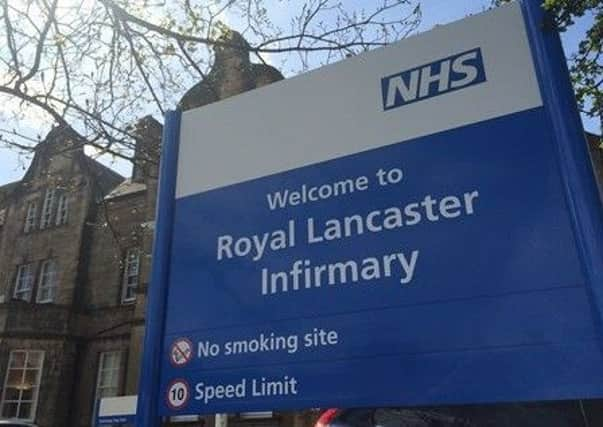Morecambe Bay health trust has £210m debt and is ‘inadequate’ at using resources, CQC report reveals


The Care Quality Commission published its inspection of University Hospitals of Morecambe Bay NHS Trust this week, giving it a “requires improvement” rating overall.
It said that safety, responsiveness and leadership all require improvement, while the trust was described as “good” at providing an effective and caring service.
Advertisement
Hide AdAdvertisement
Hide AdHowever, it was found to be “inadequate” at using resources productively and, on average, spends more to deliver the same number of services than any other trust in the country.


The trust, which runs the Royal Lancaster Infirmary, Furness General Hospital in Barrow, and Westmorland General Hospital in Kendal, also has the largest percentage deficit of all trusts in England.
It came out of special measures in 2017 and the CQC, describing it then as “good” overall, later said it had made a “truly remarkable turnaround”.
The new report said the trust is not meeting the performance standards for Referral to Treatment (RTT), Cancer or Accident & Emergency (A&E).
Advertisement
Hide AdAdvertisement
Hide AdThe CQC report said: “We rated the trust’s use of resources as Inadequate.
The trust has a material and deteriorating deficit (22 per cent of turnover) which is the largest percentage deficit in England.
The trust was awarded a £19.5m Local Price Modification (LPM) in 2016/17 in recognition that the tariff does not fully reflect the rurality and geographical factors that affect the trust.
If the LPM was applied to the 2018/19 planned deficit, the deficit as a % of turnover would still be high at 15% of turnover.
Advertisement
Hide AdAdvertisement
Hide AdThe LPM was not pursued by the trust in 2017/18 or 2018/19 in recognition that it would create a financial pressure with Morecambe Bay system partners, which would be inconsistent with the system approach being taken towards financial sustainability.
• The trust failed to balance its budget in 2017/18, reporting a deficit of £64.7m which was worse than plan by £6.1m. As at month 8 2018/19, the trust is on track to achieve a deficit of £69.4m in 2018/19 but it is £3.5m behind the year to date plan.
• The trust is reliant on external loans to meet its financial obligations and deliver its services with cumulative loans totalling £210m forecast by the end of 2018/19.
• The trust’s underlying productivity compares poorly with other trusts.
Advertisement
Hide AdAdvertisement
Hide AdFor 2017/18, the trust’s overall cost per weighted unit of activity (WAU) was the worst in the country at £4,095 compared to the national median of £3,486. This shows the trust spends more on pay and other goods and services per weighted unit of activity than all other trusts nationally.
This indicates that the trust is less productive at delivering services than other trusts by showing that, on average, the trust spends more to deliver the same number of services.
• Individual areas where the trust’s productivity compared well included staff retention, emergency re-admission rates and engagement with the Getting It Right First Time (GIRFT) programme.
Opportunities for improvement were identified in Did Not Attend (DNA) rates, cost per weighted unit of activity (WAU) across all areas, sickness absence, corporate services and estates and facilities.”
Advertisement
Hide AdAdvertisement
Hide AdThe chief inspector of hospitals, Ted Baker, said: “It is concerning that the three hospitals’ urgent and emergency services were presenting significant challenges and some of the quality improvements across the trust have not been sustained.
“The trust has worked very hard in recent years to bring its performance up to standard and it needs to do that again now. We will be monitoring the trust’s performance closely.”
A spokesman for UHMBT said: “University Hospitals of Morecambe Bay NHS Foundation Trust (UHMBT) is naturally disappointed that, following a series of inspections carried out in 2018 the Care Quality Commission has rated the Trust as “Requires Improvement” after having been previously rated as “Good” under the previous inspection regime in 2016.
However, UHMBT Chief Executive Aaron Cummins said he welcomed the report and, in particular, the view of the CQC that colleagues across the Bay continue to provide caring and effective services to our patients despite significant pressures.
Advertisement
Hide AdAdvertisement
Hide Ad“The inspection was carried out between October and December 2018, with the unannounced, site-based element conducted for our urgent care and surgical services only in December.
“The observation of inspectors gives a fair reflection of how our organisation was performing in those areas over that period,” said Aaron.
“This is the first time the Trust has experienced the new CQC & NHS Improvement (NHS I) combined inspection regime, examining our hospital services, conducting a Well-Led Review and a Use of Resources Review (which highlights the Trust’s financial performance) simultaneously. This comprehensive assessment highlights both areas of good practice and areas we know we need to continue to improve.”
“These areas include improving the care and experience for our patients in our Emergency Departments (particularly when under pressure), improving our adherence to policies and procedures relating to documentation and checking equipment, continued improvement in recruiting additional staff and delivering improvements in our productivity and efficiency.”
Advertisement
Hide AdAdvertisement
Hide Ad“Despite the pressures the health system is under, we are all disappointed with some of the observations made as part of the inspection and I know we will all work hard to ensure we respond to the issues raised in the report quickly and that those improvements are sustained.”
Aaron also commented on some of the challenges the Trust is facing, particularly in relation to the Use of Resources assessment which NHS I rated as inadequate, contributing to the overall Trust rating.
“As a result of the current financial challenges (both local and national) our hospitals have not been sufficiently invested in over recent decades, resulting in buildings which are inefficient, overly costly to run and in some parts just not good enough for our patients or staff to have a consistently positive experience.
“Our colleagues make the very best of it - we’ve seen some phenomenal results of improvements in services delivered without any additional funding, done by working innovatively in partnership with our commissioners and other providers, such as GPs and community teams to reduce demand through schemes like our Patient Initiated Follow Up initiative, improved staffing through our nurse apprenticeship scheme or delivering our annual cost improvement plans each year; but to deliver further improvements and the efficiencies required over this next period we are looking to secure much needed capital investment.
Advertisement
Hide AdAdvertisement
Hide Ad“The Trust also has a number of challenges in improving its productivity and efficiency given its geography (covering 1,000 square miles) and the need to run three hospital sites to ensure the local population has the access it needs to essential health services. That said, there is now clear evidence of areas we can be more productive in – such as our operating theatres and outpatient clinics – which we are committed to delivering and improving services as a result.”
Aaron went on to commend the Trust’s colleagues: “I am proud to see that across the board, every area of the Trust has been rated as “Good” for the care provided for our patients. This has been the highest priority for the Trust on its improvement journey to this point and will continue to be as we seek to improve further and address the issues highlighted in the report. It was also great to see some areas of
outstanding practice highlighted.
Aaron said: “The Trust is planning to spend the coming weeks discussing the final reports and the observations of inspectors with colleagues across our services and with partners across the Bay to ensure we are all sighted on the improvements we need to make. This is in addition to the actions already identified and completed or in progress following the initial feedback and the draft reports received.
“Our colleagues in Morecambe Bay have a track record of improvement by listening to feedback and using that feedback to work together to improve the services we provide for our patients. Our challenge is to ensure that those improvements are sustained, even in periods of pressure and I’m confident our teams will be able to do that again.”
The full Inspection reports for the Trust will be available from the CQC website.